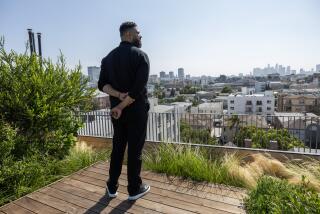Working Poor Join ‘Habitat’ on Homes : Housing: The international Christian group helps 48 families move into new dwellings in Orange County.
RANCHO SANTA MARGARITA — For the five years of their marriage, Bob and Heddy Greene have lived in a florist van tucked in a corner of the parking lot of Capistrano Valley Baptist Church in San Juan Capistrano.
It has been difficult making do with 67 square feet of living space, stashing clothes in corners, heating water from the church kitchen to take outdoor baths or showering at public beaches, cooking on two portable burners and running the van engine to charge the battery on their small black-and-white television set.
But on Saturday, life changed dramatically for the Greenes and 47 other families who began moving into Mediterranean-style condominiums that they helped to build in Rancho Santa Margarita.
It was the first project completed by the Orange County chapter of Habitat for Humanity, an international Christian organization that helps the working poor become homeowners. Moreover, it was the largest such project sponsored by Habitat in the United States.
“I thought the American dream of building and owning your own house was dead. But Habitat makes the American dream real,” said Bob Greene, 52, an accounting assistant at the El Toro Marine Corps Air Station who earns about $20,000 a year.
Like other home buyers at the Habitat project, the Greenes were required to contribute at least 600 hours of their labor to Habitat before they could sign the escrow papers.
Every Saturday since mid-February, Habitat families have been assisting volunteer construction crews under the supervision of the Fieldstone Co., a home builder that along with the Santa Margarita Co., developer of Rancho Santa Margarita, donated land for the project.
Saturday was payoff time. By 6 a.m., pickup trucks and rented vans had begun pulling up to the freshly painted beige buildings with aqua trim. The vehicles were packed with clothing, furniture and other household items, many of them purchased gradually over the months on frugal budgets or received as housewarming gifts.
The families enthusiastically greeted their new neighbors, many of whom had already become close friends, with hugs and slaps on the back. They convened for a sunrise ceremony to express their gratitude to God and to one another. Then, keys to the new homes were blessed by a priest and passed out.
“This is a celebration of a new day,” Joe Perring, president of the Habitat for Humanity Orange County affiliate, told the group of families.
The families had been selected in part because they were responsible wage earners and lived in cramped or otherwise substandard housing. They were able to buy homes for an average price of $50,000 that would have cost $95,000 to build without donated labor, materials and land, and could sell for as much as $125,000 on the open market.
Buyers were required to make a down payment of about $500 and monthly payments of between $475 and $523, including property taxes and homeowner association fees.
Twelve of the families moving into the project Saturday will have to pay rent until they complete their volunteer work requirement and qualify to become homeowners. Another five households recently dropped out of the program. Their units are vacant and available for other qualified people.
Financial loose ends also need to be tied up on the project. Perring said Habitat still needs $1.2 million to pay off an interest-free construction loan from the Fieldstone Foundation that will be due at the end of December. Fund raising has been hobbled by the weak economy, he said.
More to Read
Sign up for Essential California
The most important California stories and recommendations in your inbox every morning.
You may occasionally receive promotional content from the Los Angeles Times.






